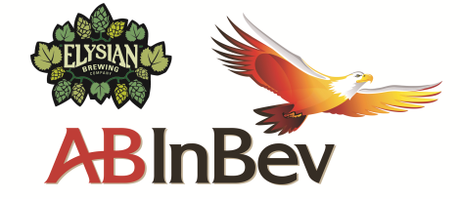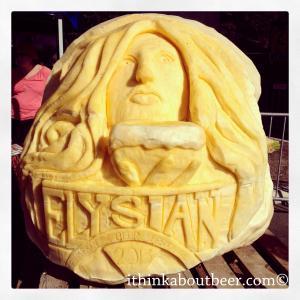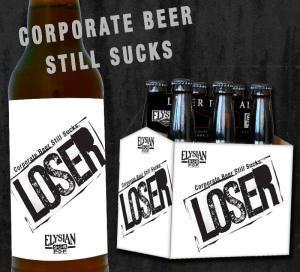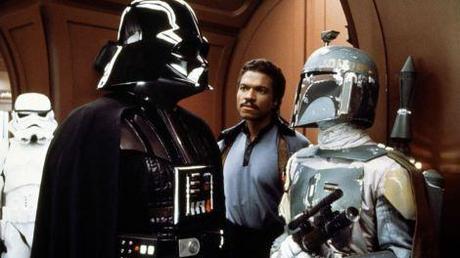 Every few months the beer world is beset by the same argument whenever AB-InBev (the multinational conglomeration of Anheuser-Busch, Interbrew, & AmBev) buys yet another brewery. It happened a few months ago when 10 Barrel Brewing succumbed to the international mega-corporation. It’s happening again. On Friday, Elysian Brewing of Seattle announced it had accepted an offer from Belgian headquartered AB-InBev. It seems like AB-InBev has been on an acquisition streak, picking up two well-respected Northwest breweries as well New York mainstay Blue Point and Illinois darling Goose Island. And these are just the craft brand purchases.
Every few months the beer world is beset by the same argument whenever AB-InBev (the multinational conglomeration of Anheuser-Busch, Interbrew, & AmBev) buys yet another brewery. It happened a few months ago when 10 Barrel Brewing succumbed to the international mega-corporation. It’s happening again. On Friday, Elysian Brewing of Seattle announced it had accepted an offer from Belgian headquartered AB-InBev. It seems like AB-InBev has been on an acquisition streak, picking up two well-respected Northwest breweries as well New York mainstay Blue Point and Illinois darling Goose Island. And these are just the craft brand purchases.
Ab-InBev has also recently spent billions picking up Korean Oriental Brewing and Mexican Grupo-Modelo. And before that, the AB (Anheuser-Busch) portion was itself acquired by Belgian based Inbev in a hostile takeover. This “merger” created the world’s largest brewing conglomeration, surpassing then leader SABMiller. Rumors have even been swirling about an attempt from AB-InBev to take over SABMiller. And while this constant stream of mergers and acquisitions may seem like business as usual amongst large corporations, is it good for craft beer?
For the TL;DR crowd: No, it’s not good for craft beer.

Attending Elysian’s Great Pumpkin Beer Festival was one of my favorite events.
I’ve been working in the beer business in Oregon for nearly 14 years. I’ve watched the last craft beer bubble burst and rebuild in the late ’90’s and early 2000’s. I’ve watched the new wave of exciting breweries grow along with their newly craft aware beer geek fans. I’ve been a part of building those brands while I’ve witnessed the struggles and declines of the big macro brands. I’ve been intimately entwined in the beer world for my entire adult life. I’m very aware of the fact that beer, even craft beer, is a business. But in many ways, it’s different than many businesses. It’s a business built on an ethos.
While this ethos is hard to put a finger on, the purpose statement of the Brewers Association, craft beer’s trade group, seems to come close:
Core Values & Beliefs
At the Brewers Association we believe in:
- Promoting and celebrating the small, independent, traditional and innovative culture of American craft brewers
- Vigorously defending our industry and providing craft brewers with a unified voice
- Fostering transparency within our own organization
- Supporting and encouraging the responsible enjoyment of beer
- Providing stewardship for 10,000 years of brewing history
- Educating brewers and consumers about the diversity, flavor and quality of beer
- Improving the economic health of American craft brewers
- Working to build a collegial community of brewers, homebrewers and brewing enthusiasts
- Promoting ethical and legal trade practices
- Building relationships and collaborating with our industry partners
Small vs. Big/Local vs. Not Local/Corporations vs. Independent
Some may say this post will come out of the present small and local mania that currently infects craft beer. And I’ve selected “infects” intentially. Anyone who’s discussed this topic with me has heard me say words similar to: “small isn’t necessarily good nor is local a synonym for quality.” For me, the quality of the product trumps everything. Well, almost everything. Too much bad beer is happily consumed because its number 1 trait is proximity. And if you’ve spent 5 minutes on my blog, you know my passion is for Belgian beers and other imports which should prove that it’s not a local vs. far argument I’m trying to make.
Nor is it a small vs. big argument. Many people bag on Sierra Nevada because it’s been successful and grown to a very large size. Yet to my mind, they’re still a fantastic brewery making really great beer; and most importantly, they’re doing it ethically. I still regularly spend money buying Sierra Nevada’s beers including their Pale Ale. There are some really great beers being made by small breweries too, but there’s a lot of bad beer that’s given a pass by consumers because it comes from a glorified garage.
I’m not even against corporations or corporate ownership of craft breweries. I regularly wrote in favor of the Duvel-Moortgat acquisition of Boulevard Brewing. Duvel-Moortgat has been a great steward of quality and helped their breweries reach the next level in both expanded destination and increased quality. I’ve even spoke in favor of SABMiller’s stewardship of brands like Pilsner Urquell which has seen a drastic improvement in quality; including cold express shipping and brown bottles.

The Responses
There are many responses on both sides of the argument every time AB-InBev gobbles up another independent brewery.
“I’m sure they have a contract that protects them from too much interference…”
Whether or not these type of clauses exist, the reality is that Elysian or 10 Barrel or whoever the next victim is is the property of Carlos Brito’ AB-InBev. If you don’t know who Carlos Brito is, you should. He could be one of the most dangerous enemies craft beer has to face. At age 54, Brito has risen up the ranks starting at Brazilian brewer Brahma to become the leader of the largest beer company the world has known – AB-InBev.
Since he became CEO, He shut down Manchester’s storied Boddingtons brewery. Then he went after the revived Hoegaarden brewery; shutting it down. Consumers noticed the quality decline almost immediately. Once all the profits had been wrung out of the cuts, share prices plateaued in 2008. Then came the hostile take over at Anheuser-Busch.

Ask Lando Calrissian how that deal he made to keep the Empire out of his Bespin mine worked…
The bloodbath at AB ended with nearly 1,400 people getting axed. Again, profits soared. He’s also cut the quality of materials like packaging, rice, & hops. He’s cut back so hard that he’s even put several of his traditional suppliers out of business. As a the CEO of a publicly traded company, his duty is to maximize profits for his shareholders. Unfortunately, the only way he knows how to do it is to get out the cutting knife. (You can read more about Carlos’s rise and his techniques in this Bloomberg Business article).
“This will be great for their expansion and distribution…”
This is very true. This will be great for Elysian’s distribution as the AB network is renowned for it’s thoroughness. And frankly, that’s the bait it uses to seduce breweries. That’s how Widmer got in bed with Anheuser Busch in the first place. Now AB-InBev owns a major stake in the Craft Brands Alliance; the grouping of Widmer, Red Hook, and Kona. But while it’s good to be part of AB’s distribution chain if you’re owned by AB-Inbev, it’s not good for independents. Recently, AB-InBev has been snapping up its distributors in states where it’s legal. Here in Oregon, they purchased Western Beverage in 2011 then picked up Morgon Distributing in 2014 and merged it with Western. These two acquisitions were immediately followed by a shedding of non AB-InBev brands.
Western and Morgon aren’t the only examples of AB-InBev seeking to circumvent the 3-tier system. Several states have seen their efforts to strangle off competition. Several of these legal battles are linked to below.
And yes, Elysian and co. will see some increased distribution to fuel their volume growth. But where does this come from? With 3,000 breweries in operation and 2,000 more coming on line, available store and bar space certainly isn’t keeping pace. AB-InBev isn’t acquiring craft brands because it believes in the segment’s quality. They’re buying out craft breweries to capture shelf space and profits. Big Red is down and continuing to slide in sales. Bud Light has been surpassed by Coors Light. AB-InBev’s former imports are in a steep decline. AB-InBev is losing valuable shelf real-estate. It needs some way to stem the flow; so they’re picking up brands they can take to stores and bars to capture their lost business. That business has to come from somewhere: the competition.
The more brands AB-InBev has to take before retailers; the easier it is for them to decide against smaller and independent brands. And let’s face it, retailers don’t really want to deal with a million different vendors so if someone can bring them a whole host of products that will fulfill their needs, why should they care if they’re only supplied by one mega-conglomeration. Each brand AB-InBev can present is tap or shelf space they’re denying an independent competitor. Distributors and breweries are in a state of constant war when it comes to beer sets and tap handles; and the more weapons you have the more territory you can conquer.
I’m not denying that this is a bad deal for AB-InBev or for Elysian/10 Barrel/Blue Point/Goose Island/Widmer/Red Hook/Kona/the next brand acquired. It is a bad deal for beer consumers. Especially beer consumers in less developed beer markets where the average beer purchaser is just transitioning to craft. Especially when AB-InBev can come in, undercut the competition, and offer half priced kegs of craft beer through the distributors they own, like they did here in Oregon with Goose Island and Shock Top.
“Who cares who owns the brewery if the beer is still good?”
You should. Yes, Goose Island’s Bourbon County is still great. Elysian Space Dust probably isn’t going to change. 10 Barrel Brewing still employs several famed brewers. Right now, the quality/flavor of these brands is what AB-InBev needs to keep its profits growing. But invariably, something will shift and Carlos Brito will bring out the carving knife. You can already see glimpses of this with Goose Island’s main beers and their movement to AB’s breweries. Yeah, the beer is good now, but for how long?
And each dollar that goes to buying those “good” beers goes toward the acquisition of another brand. Each bottle of Bourbon County purchased helps fund the effort to tip the scale in AB-InBev’s favor by helping them fund their fleet of lobbying lawyers:
- AB-InBev lobbies against Texas bill to allow sales at small breweries
- AB-InBev’s legal maneuvers to foil Illinois law and acquire Goose Island
- AB-InBev investigated by Department of Justice for corruption in India
- AB-InBev tries to buy distributorship in Kentucky to make it harder for competitive brands
- AB-InBev vs. Kentucky part 2
- AB-InBev takes over small Colorado town against citizens’ will
- AB-InBev tries to buy distributors in Missouri
- AB-InBev tries to keep restrictive laws in place to prevent growth of craft breweries in Florida
Do any Google search on “AB-Inbev lobbying” and you’ll be inundated with a massive list of examples not just from the United States but from around the world. So when I say AB-InBev is trying to destroy craft beer, it’s not just a philosophical debate but a real existential concern. Each brand acquired is another nail AB-InBev hopes to put in the coffin of its competition. Why help fund them just because they have a few products people consider “good?”
The great thing about the craft beer world is a the amount of good beer options available. As craft beer devotees, we claim to have support craft beer because we wanted a flavorful alternative to BMC. We wanted to spend money on a great tasting product that would help fund independent small businesses that actually stood for something. Now it’s time to reaffirm that stance when it actually matters. It was easy to say no to Bud because it was Bud. But now that Bud is Bourbon County, it’s not so easy to pass on what used to be a white whale. Now that you can buy a cheap pint of Goose Island because AB-Inbev is trying to undercut everyone, it’s a little harder to shell out a few extra dollars to support the craft ethos.
It does matter how you spend your money. When you buy an AB-InBev beer you not only fund their continued expansion through brewery and distributor acquisition, you validate retailers’s choice to carry their products. Each ring at a larger store shows up in the data surveys which in turn is used to make presentations to retailers proving the selling ability of the products. This helps AB-InBev squeeze the competition off the shelves, increasing their sales and furthering the cycle.
If you’d like an example, visit Belgium and walk into just about any bar or restaurant. The draft lineup will look suspiciously similar from spot to spot: Jupiler, Leffe, Hoegaarden, and Stella Artois. Walk into a corner market or grocery store and the beer cooler will look pretty similar. Many places I saw only carried AB-InBev beers. If they carried other beers, they were relegated to a warm shelf hidden deep in the back of the store. Even in some very nice bars, AB-InBev dominated the draft list and took up a sizable portion of the bottle list.
Stand Up for Craft Beer!
AB-Inbev keeps getting bigger and bigger. We can give up and just buy the beers because yes, some of those beers are damn fine products. We can say that it’s only quality that matters and feed the beast or we can not. We can make ethical choices and support the thing we all love: Craft Beer. We can pass by the Elysians and 10 Barrels and Bourbon Counties and reach for a beer that still speaks to what we love about craft beer.
It’s great for Dick Cantwell that he built something this valuable. I’ve met the man several times and he’s a genuinely nice person. His brewery was one of my favorite regional breweries and one that I was proud to work with in Oregon. This sale was no doubt good for him and for the expansion of the brand he built. I can appreciate that but I won’t be buying his beer anymore. I’ve purchased many Elysian beers in the past and even took several to Belgium where I used them in a Belgian vs. American Craft Beer Dinner. Not long after that dinner, while I was still in Belgium, I learned about 10 Barrel Brewing. Since then, this post has been forming in my head and was solidified with the Elysian buyout.
I fell in love with craft beer because of the culture, the people, and the product. I’ve earned a living and career working with beer. I go home and I read & write about beer. When I vacation, I visit breweries. I feel that after all that, it’s my duty to say something in defense of beer. My money won’t be going to AB-InBev, in any way. I know I’ll feel a little sad when I walk by one of my favorite Elysian beers and reach for something else, but when you stand for something sometimes you have to make those choices.
To Avoid:
- Bud/Bud Light
- Busch
- Natty Light
- Leffe
- Stella Artois
- Blue Point
- Elysian
- 10 Barrel
- Widmer
- Omission
- Red Hook
- Kona
- Becks
- Bass
- Boddingtons
- Spaten
- Franziskaner
- Labatts
- Kokanee
- Corona
- Modelo
- Michelob
- Goose Island
- Belle-Vue
- Brahma
- Lowenbrau
- Oranjeboom
- Rolling Rock
- Red Bridge
- Shock Top
- St Pauli Girl
- Alexander Keith’s
- This list is actually a lot longer, but this covers the majority of what’s available in North America. Here’s a more complete list so you can check your beer against it.

